
The Transitional Federal Government (TFG) was internationally recognized as a provisional government of the Somalia from 14 October 2004 until 20 August 2012, when its tenure officially ended and the Federal Government of Somalia (FGS) was inaugurated.

Presidential elections were held in Tunisia on 23 November 2014, a month after parliamentary elections. They were the first free and fair presidential elections since the country gained independence in 1956, and the first direct presidential elections after the Tunisian Revolution of 2011 and the adoption of a new Constitution in January 2014.
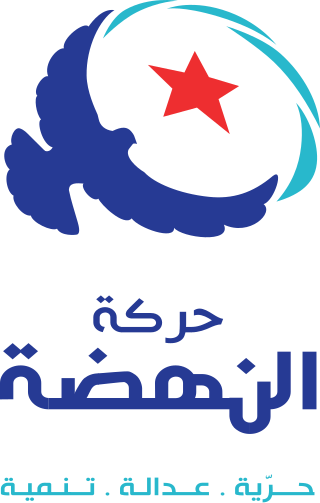
The Ennahda Movement, also known as the Renaissance Party or simply known as Ennahda, is a self-defined Islamic democratic political party in Tunisia.

Habib Essid is a Tunisian politician who was Head of Government of Tunisia from 6 February 2015 to 27 August 2016. He was the first Head of Government to be appointed following the adoption of the new constitution and thus considered to be the first Head of Government of the Second Tunisian Republic. He previously served as Minister of the Interior in 2011.
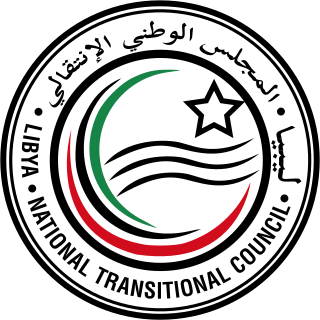
The aftermath of the 2011 Libyan civil war has been characterized by marked change in the social and political order of Libya after the overthrow and killing of Muammar Gaddafi in the civil war that was fought in Libya in 2011. The country has been subject to ongoing proliferation of weapons, Islamic insurgencies, sectarian violence, and lawlessness, with spillovers affecting neighboring countries including Mali.

The Constituent Assembly of Tunisia, or National Constituent Assembly (NCA) was the body in charge of devising a new Tunisian constitution for the era after the fall of President Zine El Abidine Ben Ali and his Constitutional Democratic Rally (RCD)–regime. Convoked after the election on 23 October 2011, the convention consisted of 217 lawmakers representing Tunisians living both in the country and abroad. A plurality of members came from the moderate Islamist Ennahda Movement. The Assembly held its first meeting on 22 November 2011, and was dissolved and replaced by the Assembly of the Representatives of the People on 26 October 2014.

Hamadi Jebali is a Tunisian engineer, Muslim politician and journalist who was Prime Minister of Tunisia from December 2011 to March 2013. He was the Secretary-General of the Ennahda Movement, a moderate Islamic party in Tunisia, until he left his party in December 2014 in the course of the 2014 Tunisian presidential election.

The first cabinet of Tunisian Head of Government Hamadi Jebali was presented on 20 December 2011. Jebali has been appointed by interim President Moncef Marzouki, who had been elected by the National Constituent Assembly, a body constituted to draft a new constitution after the Tunisian Revolution and the fall of former President Zine El Abidine Ben Ali in Spring 2011. It took office on 24 December 2011. The three parties in the "Troika" coalition are the Islamist Ennahda Movement, the centre-left secularist Congress for the Republic (CPR), and the social democratic Democratic Forum for Labour and Liberties (Ettakatol).
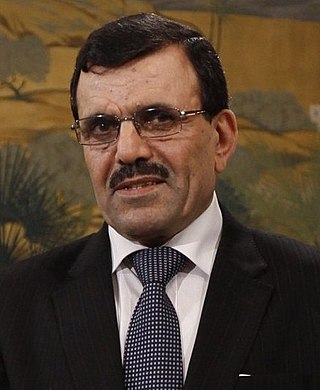
Ali Laarayedh is a Tunisian politician who was Prime Minister of Tunisia from 2013 to 2014. Previously he served in the government as the Minister of the Interior from 2011 to 2013. Following the resignation of Prime Minister Hamadi Jebali, Laarayedh was designated as Prime Minister in February 2013. He is a member of the Ennahda Movement.
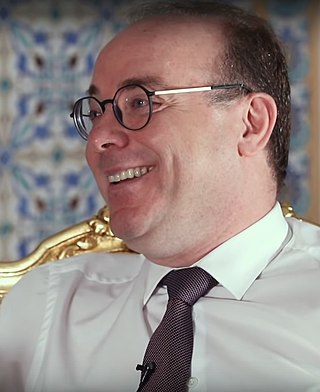
Elyes Fakhfakh is a Tunisian politician. He served as the Minister of Tourism and, starting on 19 December 2012, as the Minister of Finances as well, under Prime Minister Hamadi Jebali. He served as the Prime Minister of Tunisia from 27 February to 2 September 2020.
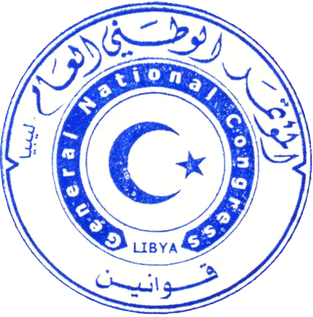
The General National Congress or General National Council was the legislative authority of Libya for two years following the end of the First Libyan Civil War. It was elected by popular vote on 7 July 2012, and took power from the National Transitional Council on 8 August.
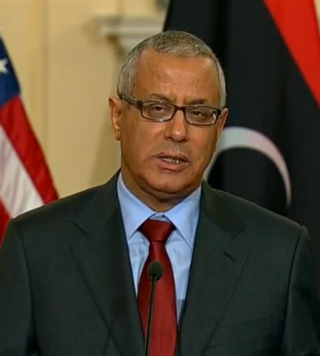
Ali Zeidan is a former Prime Minister of Libya. He was appointed by the General National Congress on 14 October 2012, and took office on 14 November after Congress approved his cabinet nominees. Prior to the Libyan Civil War, Zeidan was a Geneva-based human rights lawyer. According to the BBC, he is considered by some local observers as a strong-minded liberal. He was ousted by the parliament committee and fled from Libya on 14 March 2014. However, he told a press conference in Rabat, Morocco, that the ousting was invalid.

The cabinet was selected by Prime Minister Ali Zeidan on 30 October 2012 and was approved by the General National Congress on 31 October 2012 together with approving Zidan as Libya's first post-war Prime Minister. The cabinet is composed of the following ministers: Two women were selected to cabinet, and select ministries went to political independents who were not associated with any party.

The second Azarov government was the government of Ukraine from 24 December 2012 to 28 January 2014. It was dissolved amidst the Euromaidan protests. The ministers (except Prime Minister Mykola Azarov who was replaced by Deputy Prime Minister Serhiy Arbuzov, continued briefly as a caretaker government. On 27 February 2014 Ukraine's parliament approved a resolution to formally dismiss the government.
The secretary of the Department of the Prime Minister and Cabinet is the public service head of Australia's Department of the Prime Minister and Cabinet and the most senior public servant in the administration of Government in Australia.

Mehdi Jomaa is a Tunisian engineer and was the acting Prime Minister of Tunisia from 29 January 2014 to 6 February 2015. He was chosen on 14 December 2013. Jomaa was Minister of Industry in the Ali Laarayedh government.
A political crisis evolved in Tunisia following the assassination of leftist leader Mohamed Brahmi in late July 2013, during which the country's mainly secular opposition organized several protests against the ruling Troika alliance that was dominated by Rashid al-Ghannushi's Islamist Ennahda Movement. The events came as part of the aftermath of the Tunisian Revolution which ousted the country's longtime president Zine El Abidine Ben Ali, followed by a general election which saw Ennahda win a plurality alongside Moncef Marzouki's allied Congress for the Republic (CPR). The crisis gradually subsided when Prime Minister Ali Laarayedh resigned and a new constitution was adopted in January 2014.

The ninety-fourth Cabinet of Bulgaria took office on November 7, 2014. It was a coalition government chaired by Boyko Borisov. The government was formed after Borisov's party, GERB, won the 2014 parliamentary election. As GERB won 84 out of the 240 seats in the National Assembly, they were compelled to form a coalition to legally govern.
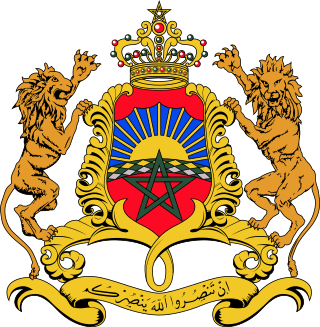
The prime minister of Morocco, officially head of government, is the head of government of the Kingdom of Morocco. The prime minister is chosen by the king of Morocco from the largest party elected to parliament. The Constitution of Morocco grants executive powers to the government and allows the head of government to propose and dismiss cabinet members, provincial governors, and ambassadors, to oversee government programs and the delivery of public services, and to dissolve the lower house of parliament with the king's approval.
The following lists events that happened during 2013 in the Tunisian Republic.


















